Related Research Articles

Luigi is a fictional character featured in video games and related media released by Nintendo. Created by Japanese video game designer Shigeru Miyamoto, Luigi is portrayed as the younger fraternal twin brother and sidekick of Mario. Defined by his kind-hearted, yet cowardly demeanor, Luigi appears in many games throughout the Mario franchise, oftentimes accompanying his brother.

Prince Luigi Amedeo, Duke of the Abruzzi, was an Italian mountaineer and explorer, briefly Infante of Spain as son of Amadeo I of Spain, member of the royal House of Savoy and cousin of the Italian King Victor Emmanuel III. He is known for his Arctic explorations and for his mountaineering expeditions, particularly to Mount Saint Elias and K2. He also served as an Italian admiral during World War I. He created Villaggio Duca degli Abruzzi in Italian Somalia during his last years of life.

Pier Luigi Nervi was an Italian engineer and architect. He studied at the University of Bologna graduating in 1913. Nervi taught as a professor of engineering at Rome University from 1946 to 1961 and is known worldwide as a structural engineer and architect and for his innovative use of reinforced concrete, especially with numerous notable thin shell structures worldwide.
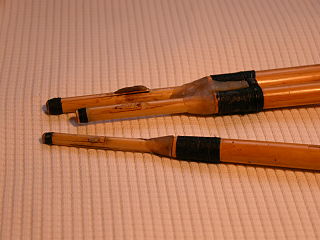
The launeddas are a traditional Sardinian woodwind instrument made of three pipes, each of which has an idioglot single reed. They are a polyphonic instrument, with one of the pipes functioning as a drone and the other two playing the melody in thirds and sixths.
Sardinia is probably the most culturally distinct of all the regions in Italy and, musically, is best known for the tenore polyphonic singing, sacred chants called gosos, the launeddas, an ancient instrument that consists of a set of three single-reed pipes, all three mouth-blown simultaneously using circular breathing, with two chanters and one drone and the cantu a chiterra, a monodic song that is accompanied by guitar, widespread mainly in the center and north of the island.

Luigi Delneri, often incorrectly written as Del Neri, is an Italian football manager and a former player.
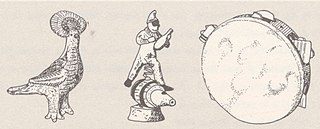
Italian folk music has a deep and complex history. National unification came quite late to the Italian peninsula, so its many hundreds of separate cultures remained un-homogenized until quite recently. Moreover, Italian folk music reflects Italy's geographic position at the south of Europe and in the center of the Mediterranean Sea: Celtic, Slavic, Arabic, Greek, Spanish and Byzantine influences are readily apparent in the musical styles of the Italian regions. Italy's rough geography and the historic dominance of small city states has allowed quite diverse musical styles to coexist in close proximity.
Efisio Melis (1890–1970) was a Sardinian folk musician, and noted to have been one of the greatest launeddas players in the world.

Franco Ferrara was an Italian conductor and teacher. Among his many students are various prominent conductors, including Roberto Abbado, Riccardo Chailly, Andrew Davis and Riccardo Muti.
Gigi may refer to:
Luigi Apolloni is an Italian football manager and former player, who played as a centre-back. At club level, Apolloni is mainly remembered for his time with Italian side Parma Calcio 1913, where he won several titles during his 13 seasons with the club. At international level, he was a member of the Italy national football team that reached the final of the 1994 FIFA World Cup.

Luigi De Agostini is an Italian former professional footballer. He played as a defender, primarily in the role of an attacking full-back or winger on the left flank, although he was also capable of playing in several other positions both in defence and in midfield. He represented the Italy national team at UEFA Euro 1988 and the 1990 FIFA World Cup.
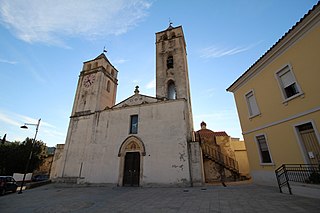
San Vito is a comune (municipality) in the Province of South Sardinia in the Italian region Sardinia, located about 45 km (28 mi) northeast of Cagliari.

Luigi Mastrangelo is an Italian men's volleyball player, a member of Italy men's national volleyball team 1999-2012. Mastrangelo with national team winner silver and bronze medalist of the Olympic Games, multiple winner of the European Championship and World League. He was the star of the Italian team in their course.
Oni Wytars is an early music ensemble that was founded in 1983 by Marco Ambrosini and Peter Rabanser.
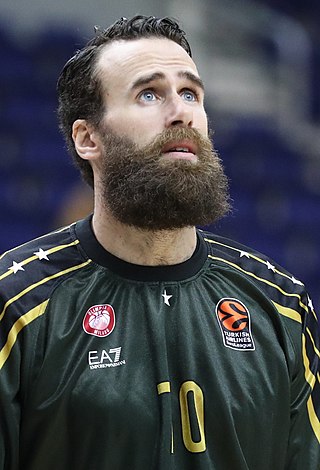
Luigi "Gigi" Datome is an Italian professional basketball player who last played for Olimpia Milano of the Lega Basket Serie A (LBA) and the EuroLeague. Standing at 2.03 m, he played at the small forward and power forward positions. Datome was an All-EuroLeague Second Team selection in 2016.

Luigi Sepe is an Italian professional footballer who plays as a goalkeeper for Serie A club Lazio, on loan from Salernitana.
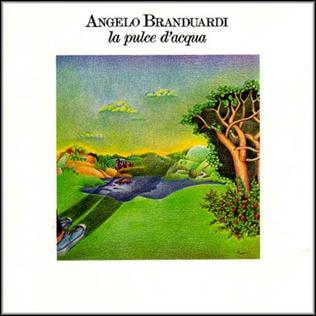
La pulce d'acqua is an album by Italian singer-songwriter Angelo Branduardi. It was released in 1977 by Polydor. A French edition, entitled La Demoiselle, was released in 1979; an English edition, entitled Fables and Fantasies and with lyrics written by Peter Sinfield, was released in 1980.
Luigi Palumbo is an Italian footballer who currently plays as a defender for Vis Afragolese.
References
- ↑ "Luigi Lai". launeddas.eu. Retrieved 30 August 2023.